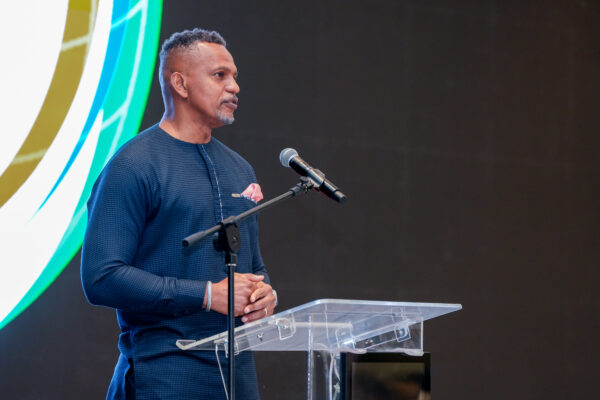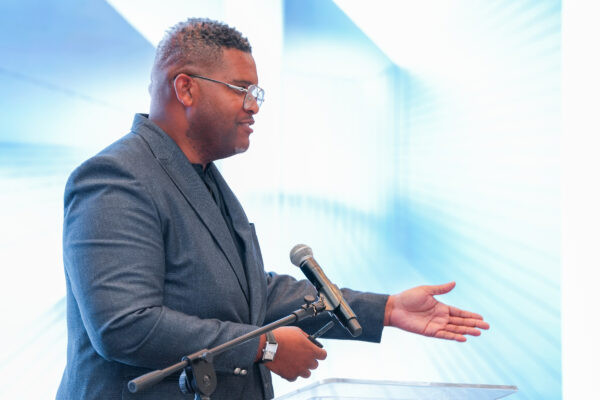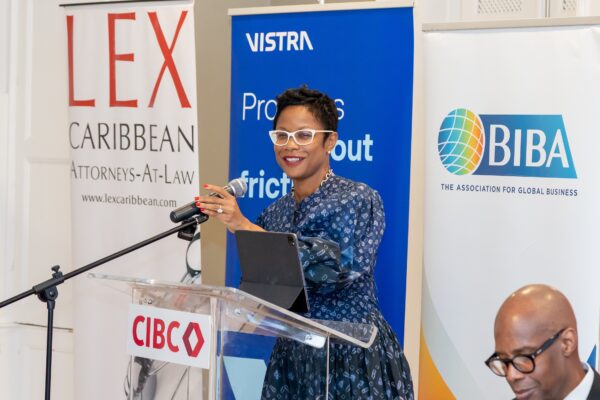Barbados’ Chief Education Officer has outlined a series of bold steps the Government is undertaking to restore the island’s near-perfect literacy rate and propel centres of excellence throughout the school system.
Dr. Ramona Archer-Bradshaw made the announcement while addressing senior secondary school students, teachers, and their peers from the Barbados Community College. The occasion was the annual Global Business Week Secondary Schools Symposium, hosted by BIBA, the Association for Global Business at the Lloyd Erskine Sandiford Centre on October 21.
Acknowledging a decline in the island’s once-vaunted 98 percent literacy rate, Archer-Bradshaw expressed concern over recent trends.
“Over the past five years . . . we’ve been hearing stories of children who are unable to read. And these are children at the higher level within the primary school, and children within secondary school,” she told the audience of students, educators, and business community representatives.
“As a country, we should not feel comfortable with the fact that we are moving from 98% literacy to a lesser number, because we don’t know what it is now, but we know it’s declining.”
She emphasized that the country’s education reform must be firmly rooted in literacy and reading proficiency.
“Learning to read doesn’t only help students to pass exams, it opens students’ worlds, it helps them to dream bigger. . . . We have set the bold target of ensuring that by age seven, all students across Barbados should be able to read,” she stated, noting that the target is set for December next year.
At the heart of this transformation is what Archer-Bradshaw described as “a bold, data-driven strategy with clearly defined benchmarks,” aimed at ensuring quality in education and aligning Barbados with global standards of excellence.
Referencing findings from the Future of Jobs Report, which predicts that 65 percent of primary school students will eventually work in jobs that do not yet exist, the Chief Education Officer called for a fundamental shift in how education is delivered.
She stressed that schools must become more forward-thinking, focusing on preparing students for the demands of the future workforce. This includes cultivating skills such as critical thinking, collaboration, communication, and self-confidence.
As part of this reform, the Ministry of Education has already launched its “centres of excellence” initiative, with a pilot programme underway at the Maria Holder Gall Hill Early Childhood Development Centre of Excellence. There, students will be introduced to STREAM – science, technology, reading, engineering, arts, and mathematics – through play-based learning, linking enjoyment with education.
To support these ambitious goals, Archer-Bradshaw appealed to the local business community for assistance. She encouraged corporate sponsorships of reading materials, technology, and books, as well as the donation of time and expertise.
During her remarks at the symposium, BIBA’s Executive Director Carmel Haynes also encouraged the student participants to seize the opportunities before them.
“[Global business] companies can only survive here because they have people like you work in them at all levels of the company including top management. It is true that once upon a time a large number of these firms were headed by foreign managers but over the decades Barbadians have become so skilled and educated that over 80% of the companies are led by Barbadians. So, as business studies students, remember that you are preparing not just to work for local companies, but to be part of a truly global workforce.” she outlined.
Haynes spotlighted several key areas for growth and awareness, including financial literacy, the role of innovation and technology in business transformation, sustainable aquaculture, and the intersection of sustainability and entrepreneurship.
Linking the session to the week’s theme of Resilience: Adapting. Transforming. Thriving, Haynes told the students that building adaptability was a key attribute for thriving in any global environment. “To succeed in the global workforce, you will need to develop *Adaptability*, which is simply your willingness to embrace change and learn continuously,” she said.
- By Geralyn Edward for BIBA, the Association for Global Business




